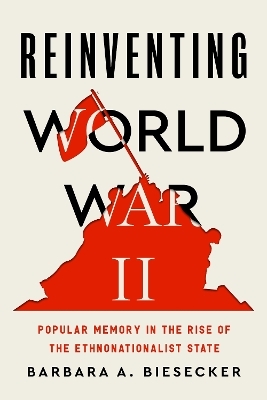
Reinventing World War II
Popular Memory in the Rise of the Ethnonationalist State
Seiten
2024
Pennsylvania State University Press (Verlag)
978-0-271-09782-4 (ISBN)
Pennsylvania State University Press (Verlag)
978-0-271-09782-4 (ISBN)
By the 1970s, World War II had all but disappeared from US popular culture. But beginning in the mid-eighties it reemerged with a vengeance, and for nearly fifteen years World War II was ubiquitous across US popular and political culture. In this book, Barbara A. Biesecker explores the prestige and rhetorical power of the “Good War,” revealing how it was retooled to restore a new kind of social equilibrium to the United States.
Biesecker analyzes prominent cases of World War II remembrance, including the canceled exhibit of the Enola Gay at the National Air and Space Museum in 1995 and its replacement, Steven Spielberg’s Saving Private Ryan, Tom Brokaw’s The Greatest Generation, and the United States Holocaust Memorial Museum. Situating these popular memory texts within the culture and history wars of the day and the broader framework of US political and economic life, Biesecker argues that, with the notable exception of the Holocaust Memorial Museum, these reinventions of the Good War worked rhetorically to restore a strong sense of national identity and belonging fitted to the neoliberal nationalist agenda.
By tracing the links between the popular retooling of World War II and the national state fantasy, and by putting the lessons of Foucault, Derrida, Lacan, and their successors to work for a rhetorical-political analysis of the present, Biesecker not only explains the emergence and strength of the MAGA movement but also calls attention to the power of public memory to shape and contest ethnonational identity today. This book will interest rhetoricians and historians as well as students and scholars in the fields of US politics and communication studies.
Biesecker analyzes prominent cases of World War II remembrance, including the canceled exhibit of the Enola Gay at the National Air and Space Museum in 1995 and its replacement, Steven Spielberg’s Saving Private Ryan, Tom Brokaw’s The Greatest Generation, and the United States Holocaust Memorial Museum. Situating these popular memory texts within the culture and history wars of the day and the broader framework of US political and economic life, Biesecker argues that, with the notable exception of the Holocaust Memorial Museum, these reinventions of the Good War worked rhetorically to restore a strong sense of national identity and belonging fitted to the neoliberal nationalist agenda.
By tracing the links between the popular retooling of World War II and the national state fantasy, and by putting the lessons of Foucault, Derrida, Lacan, and their successors to work for a rhetorical-political analysis of the present, Biesecker not only explains the emergence and strength of the MAGA movement but also calls attention to the power of public memory to shape and contest ethnonational identity today. This book will interest rhetoricians and historians as well as students and scholars in the fields of US politics and communication studies.
Barbara A. Biesecker is Professor in the Department of Communication Studies at the University of Georgia. She is the author of Addressing Postmodernity: Kenneth Burke, Rhetoric, and a Theory of Social Change and coeditor of Rhetoric, Materiality, and Politics.
| Erscheinungsdatum | 04.10.2024 |
|---|---|
| Reihe/Serie | RSA Series in Transdisciplinary Rhetoric |
| Zusatzinfo | 6 Halftones, color |
| Verlagsort | University Park |
| Sprache | englisch |
| Maße | 152 x 229 mm |
| Gewicht | 367 g |
| Themenwelt | Geschichte ► Allgemeine Geschichte ► 1918 bis 1945 |
| Geisteswissenschaften ► Geschichte ► Regional- / Ländergeschichte | |
| Geschichte ► Teilgebiete der Geschichte ► Militärgeschichte | |
| Sozialwissenschaften ► Kommunikation / Medien ► Kommunikationswissenschaft | |
| ISBN-10 | 0-271-09782-5 / 0271097825 |
| ISBN-13 | 978-0-271-09782-4 / 9780271097824 |
| Zustand | Neuware |
| Informationen gemäß Produktsicherheitsverordnung (GPSR) | |
| Haben Sie eine Frage zum Produkt? |
Mehr entdecken
aus dem Bereich
aus dem Bereich
ein Psychologe erlebt das Konzentrationslager
Buch | Hardcover (2024)
Kösel (Verlag)
22,00 €
Mythos „Stauffenberg-Attentat“ – wie der 20. Juli 1944 verklärt und …
Buch | Hardcover (2024)
Goldmann (Verlag)
24,00 €


